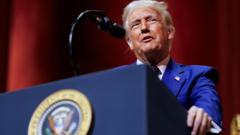In a significant political move, Sinn Féin leaders have opted to boycott the upcoming St Patrick's Day celebrations at the White House, a decision that could potentially strain long-standing connections with influential U.S. politicians. This bold stance arises from recent inflammatory comments made by former President Donald Trump, particularly regarding the situation in Gaza and his derogatory remarks about Ukraine's President Volodymyr Zelensky.
Traditionally, Northern Ireland's first and deputy first ministers attend the White House festivities each year. However, Sinn Féin's leadership feels that the moral implications of Trump's statements warrant this rare boycott, even if it risks alienating some supporters within the Irish-American community, many of whom favor Trump's policies.
Earlier this month, Trump controversially proposed that the U.S. should take control of the Gaza Strip, suggesting plans to transform it into a "Riviera." This assertion faced backlash from international leaders, sparking widespread condemnation from nations like France and Germany, as well as warnings from U.N. Secretary-General Antonio Guterres about the potential for ethnic cleansing in the region.
Also stirring controversy, Trump labeled Zelensky a "dictator," igniting fresh criticism, even among former allies in the Democratic Unionist Party (DUP). These remarks followed Zelensky's commentary on U.S.-Russia talks, highlighting a perceived misinformation campaign by the Trump administration.
In this politically charged atmosphere, Sinn Féin's leaders, including Michelle O'Neill and Mary Lou McDonald, feel empowered to express dissent without the constraints faced by other political parties. Their decision was notably publicized during an announcement in Dublin, deliberately drawing attention to their stance against the backdrop of Trump's incendiary rhetoric.
Meanwhile, the focus is shifting towards Deputy First Minister Emma Little-Pengelly, who appears eager to attend the festivities. Since the offices are joint, her travel may still proceed unless vetoed by O'Neill, a move seemingly unlikely given the current political climate. With the potential for Northern Ireland to be represented in Washington, the absence of joint ministers adds another layer of complexity to the situation, signaling the significant ramifications of this political gamble by Sinn Féin in the transatlantic relationship.




















